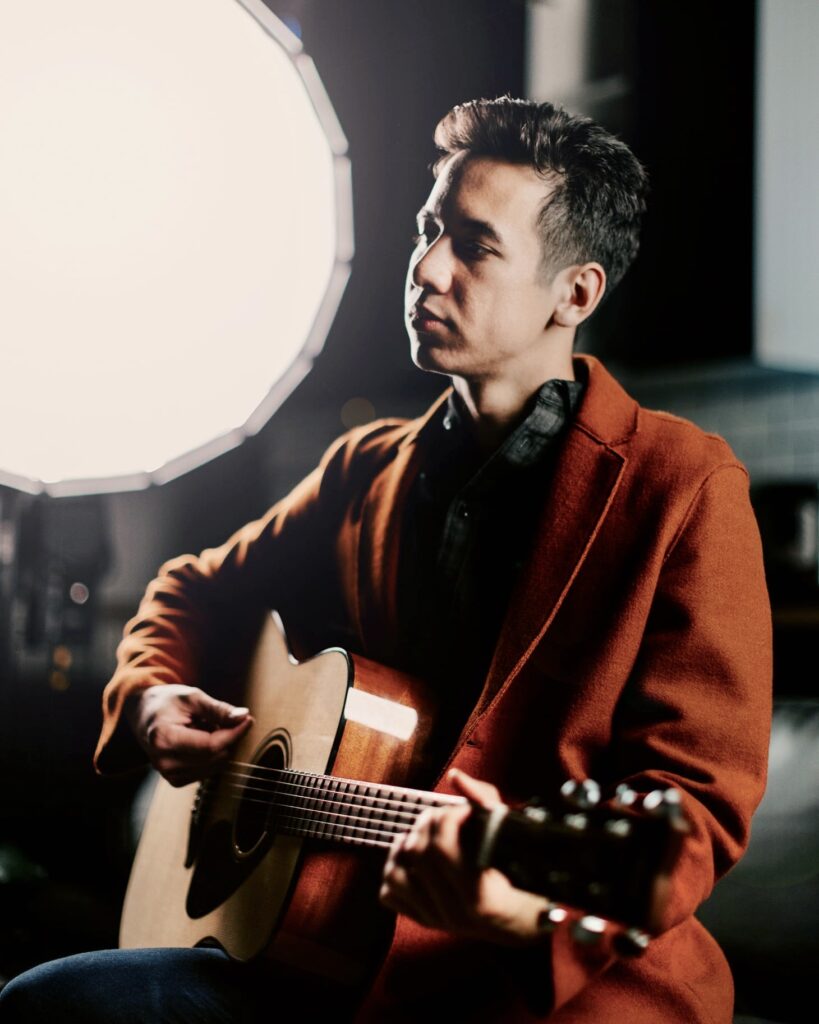So, you want to learn how to sing opera?
You’re certainly up for a challenge! However, rest assured; anyone can learn how to sing opera style… even if you are one day dreaming of becoming a professional opera singer.
Opera is one of the most beautiful forms of singing, because it’s sung in the most pure form of our voice. Opera singers sometimes seem like they have a magical talent to make their voice ring out so beautifully.
But don’t worry! It’s not magic.
With a lot of time and plenty of persistence, you, too, can sing opera just like Luciano Pavarotti, Joan Sutherland, and all the best of the best in this beautiful style of singing.
And the first step is knowing what exactly is the difference between opera and pop singing.
So let’s get started.
Opera Singing vs. Pop Singing
We hear pop music everywhere, all throughout our day, no matter what country you live in. (For the sake of this guide, we’ll refer to all casual styles of singing, such as R&B, jazz, rap, alternative, etc. as “pop”.) It doesn’t take someone trained in singing to notice that opera sounds very different from pop.
So, why is that?
Opera and pop singing are not two completely different skill sets. Opera is simply the highest degree of skill in singing and I would consider it an art form, whereas pop (and the other styles) do not strive or need to meet the same standards.
In the most general sense, you can think of the level of skill in singing like this: If pop singing is like wearing sweats or jeans to an event, classical singing is wearing some nice khakis or dress pants, and opera singing is like wearing a 3-piece suit or floor-length evening gown.
Opera is the highest level of singing talent and potential.
Check out this video here, explaining why opera sounds so vastly different from all other types of singing: Why Opera Singers Sound Different from Popular Music Singers
Just like the video explains, opera is very much like an olympic level of a sport. Once you achieve top tier opera singing talent, you’ve fulfilled the best of your vocal potential!
All three types of singing (pop, classical and opera) are built up of the same foundation of singing, it’s just that pop music is a very casual style of singing. You can get away with not sounding as polished. Opera music is very, very polished, therefore you have to make sure you master and uphold your singing foundation.
Many pop singers learn the bare minimum of a singing foundation (for example, they stick to a small range of notes, they may or may not choose to learn or use vibrato, etc.) because their goal is a more casual and laid back feel, and they can get away with not learning to use their voice to their highest potential in order to sing pop well.
If you want to learn to sing opera, you’ve got to have your foundation mastered. The reason opera is regarded as difficult is only due to the time and work opera singers have put into this craft. And that means that the only thing standing in your way of learning to sing like an opera singer is practice!
And that starts with your singing foundation.
Let’s talk about the basic skill all singers need as their vocal foundation (regardless of genre), and just how much further you need to take them to achieve operatic talent!
1. Build A Solid Vocal Foundation For Singing Opera

It might seem like it goes unsaid, but I’ll say it anyway: before you learn how to sing like an opera singer, you must learn the basics of singing first! Trying to tackle opera singing before you learn your basics is like trying to learn gymnastics before you learn to walk.
This may be something you want to consider getting a vocal coach to help you teach how to control your vocal cords and help you able to sing well during their singing lessons. It can be a bit difficult to find the right teacher, but it will pay a hundredfold in terms of your vocal technique.
The basic foundation of singing that you want to have under your belt before you tackle the operatic style is:
- mastering the 3 vocal registers…
- learning to properly shape the 5 singing vowels…
- breathing from your diaphragm
Without a solid foundation in these three areas of singing, opera will be nearly impossible to achieve. Many pop singers have a good level of skill in all three of these, but we’re going to need to absolutely master them in order to sing like an opera singer.
So, let’s talk about those 3 vocal registers, why they’re absolutely essential in singing, and why they’re even more essential for operatic singing.
2. The 3 Vocal Registers
Opera songs — or arias, as opera songs are called — tend to have a very large range over the course of the aria (meaning the notes range from very low to very high within the same piece). Most pop music these days don’t have very big ranges in pitch, so sometimes we can get by without switching vocal registers. Some singers lead successful vocal careers without leaving one octave of pitch!
However, that’s not the case for opera.
To sing the range of most arias, singers will have to master their three vocal registers, which are:
- Chest voice…
- Mixed voice…
- Head voice…
If you do not learn to sing in each of these vocal registers, you’ll find yourself either completely unable to handle the range of an aria, or it will make you feel the need to strain and push to hit those notes…
And we don’t want to strain—ever!—but especially so in opera, which is meant to sound pure, effortless and angelic.
Opera singers are actually physically relaxed when they sing, never needing to push or strain at all to hit any of the notes they sing. This is because when you learn to move your voice through these registers, you don’t need to try to strain or push!
If you don’t believe me, check out the amazing opera legend, Luciano Pavarotti, explaining exactly this! Luciano Pavarotti speaks about and demonstrates Covering the Sound.
Everyone has a chest voice, mixed voice, and head voice. It’s just a matter of finding yours, and smoothing out the transitions between them in order to handle such crazy jumps throughout the range of an aria.
1. Chest Voice
Chest Voice is the lowest part of your range. It’s composed of the lowest notes you can sing. You’ve used your chest voice for most of the day already; chest voice is also where our speaking voice resides! You’ll feel it resonate in your chest, and in the front of your mouth, toward your teeth.
But remember: chest voice is only the lowest part of your range.
You’ll know when chest voice ends; do this little exercise now: start at the bottom of your range, and sing on “Ah” up like a slide until you feel like your voice gets stuck in your throat, and you feel the need to strain. Stop when you hit this point before you strain, don’t push or force anything out! (Again, never strain no matter what genre you sing!)
3. Head Voice
Head Voice is the very top of your vocal range. It’s very soft and angelic-sounding. Those crazy-high notes that opera singers hit are in their head voice.
It’s that part where most people ordinarily don’t practice because:
- They aren’t sure how to practice it…
- And we don’t use it in our everyday life.
But it’s an essential part of your voice if you’re serious about learning how to sing opera.
The problem — especially for those who want to learn to sing opera — is where head voice and chest voice meet… At that vocal break.
That’s where mixed voice comes in.
3. Mixed Voice
Mixed Voice is the middle of your range. It’s where your chest voice and head voice meet (at that vocal break), and this register is a mixture of the two voices.
Remember when we talked about how opera arias have a huge range of notes? You’re going to constantly be going up and down your range, passing through your vocal break — also called the passaggio — and we need to make sure that vocal break doesn’t actually sound like a break when you sing through it. You can smooth out that transition so that it’s nearly undetectable by learning mixed voice.
So, the first step in learning how to sing like an opera singer is developing the range of an opera singer, and learning how to navigate your voice through all three of these vocal registers.
It does take plenty of time for the muscle-memory to kick in, but once it does, you’ll have mastered your vocal range!
It’s a very worthwhile journey to take, and especially essential for opera singing.
Now that you’ve mastered your range, let’s take a look at the most important aspect of all singing, for without it, we wouldn’t be singing at all!
And that is breathing.
3. Breath Support For Opera Singers

Learning how to breathe from your diaphragm is something every singer needs to learn, regardless of the genre. However, if you want to learn how to sing like an opera singer, the need for proper breath support is that much more important.
If you want to learn how to breathe from your diaphragm, check out the post here!
The reason breathing is so much more essential for opera singing is:
- to project your voice…
- to be able to hold very long notes…
- to achieve a beautiful, pure tone…
Opera singers often have to sing loud enough that they’re heard over full orchestras, and oftentimes they don’t even have the aid of a microphone!
Not only does great breath support help your volume, it helps you to create that beautiful tone that all opera singers seem to be magically blessed with.
One way opera differs from pop and classical music is that there is very little time to breathe in an aria. Most of the music is filled with vocals, meaning that you need plenty of air to sustain those notes.
There isn’t always room to keep taking in air, so instead, opera singers need to learn to take in plenty of air in one breath so that they can manage to use it for long strings of notes without needing to take another breath.
Here is a tip from the great Luciano Pavarotti, explaining how he’s achieved his amazing breath support: Pavarotti speaks of using a Breath Holding Exercise
Practice holding your breath to strengthen the muscles of your diaphragm!
4. Singing Vowels and Space
Another basic foundation of any kind of singing is learning to form singing vowels, which are 5 specific shapes you form with your mouth in order to maintain plenty of space in your mouth for your voice to circulate with a beautiful tone.
This is another one of those basics that pop singers can learn halfway, and still sound good enough to get by.
Again; pop music is a very casual type of singing. We don’t have to sound sophisticated in pop music. However, mastering your singing vowels and having plenty of space will improve your tone no matter what genre you sing in, and I encourage every singer to master this, opera or otherwise.
But with opera, the first thing you’ll notice is how rounded their voice sounds. It has this proper, grandiose sound that not only rings out beautifully, but it sounds so very polished.
Opera singers achieve this through very well structured vowel shapes.
Here’s a video describing the five singing vowels (A, E, Ah, O, Oo) and how to shape them: Singing Vowels Clearly – FOR MORE BEAUTIFUL SINGING!
Notice how tall your mouth feels when you shape these vowels. Raise your eyebrows and think tall as you sing, lowering your tongue a bit and raise your soft palette. (You can raise your soft palate by pretending to or actually yawning).
See how much more space you have? Try singing like this, maintaining that shape. Notice just how much your sound matures in a span of seconds!
5. Vibrato

If you want to sing opera, you need to build up your vibrato!
Vibrato is a staple of opera singing. It’s absolutely essential if you want to sing like an opera singer. (If you don’t know how to sing with vibrato, or you’d like to work on controlling it, check out this post here!)
Vibrato not only sounds beautiful and adds dynamic to your vocals, it also helps you to project your voice, which is also essential for an opera singer!
Listen to this performance, noticing how often vibrato is used, and how much control Renée Fleming has! Renée Fleming: Casta Diva (Bellini)
When you put together all these singing foundations, and perform them all to the best of your capability, you’ll be singing like an opera singer in no time!
Mastering your range, breath support, vibrato, singing vowels and maintaining all that space will sound very different from how it feels and sounds to sing pop music.
It might feel like you’re almost being a little dramatic when you sing this way, but that’s a huge key in learning to sing opera. Opera is dramatic; it’s a drama put to music! It’s very similar to musical theatre in that way; you’re telling a story.
And that leads us to the next element of operatic singing:
Singing with emotion.
6. Singing with Emotion (Tell the Story!)
Singing with emotion is also something that is important in any genre of singing. But it is not just important when it comes to musical theatre and opera; it is essential.
Contrary to singing musical theatre, it’s even more important for you to convey emotions with your voice and facial expressions when singing opera because most arias are in a language other than English. Most often they’re written in Italian, German or French.
And these days, operas will be performed to an entire crowd of people who don’t even speak that language!
Your beautiful voice is only half of what those people came to experience; they want to experience the story of the song, and what’s so special about opera is that opera singers pour emotion into their voice and expression in such a way that we feel the story they’re telling, even when we can’t understand the words.
Check out this amazing performance by Diana Damrau, and pay special attention to the acting! The Magic Flute – Queen of the Night aria (Mozart; Diana Damrau, The Royal Opera)
So when you’re working on your aria that’s written in a language you don’t speak, translate it and really familiarize yourself with what you’re saying.
Really think about what you’re singing, and pour all of that emotion into every note you sing!
More on singing with emotion in this post here!
This brings us to our final tip on how to sing opera, and that’s rolling your R’s.
7. Roll Those R’s!

Opera is so special, and part of the reason for that is because they stay so close to their roots and authenticity. A huge part of being an opera singer is really familiarizing yourself with the language in which you’re singing in, and due to opera’s roots, rolling your R’s is a huge staple!
Check out this performance from Luciano Pavarotti and listen to how they roll their R’s (you can hear this in practically any other opera performance as well!). Luciano Pavarotti sings “Nessun dorma” from Turandot (The Three Tenors in Concert 1994)
Along the same lines, it will certainly help to familiarize yourself with how things are pronounced differently in the language your aria is written in.
Adding these details, however small, will only help to make both you and your performance sound as authentic as possible!
Check out this video if you want to learn how to roll your R’s!
Conclusion
Opera is a mastering of the foundation of all singing basics, of utilizing them to their fullest potential. Remember to start at the beginning; no one—not even Luciano—was born with this talent. It was honed and improved upon throughout the lives of all the greats, just as it can be for you! Start with that solid foundation, and don’t stop practicing and improving until you reach the highest level of your potential!
Then, make sure to stay as authentic as you can to the arias you sing by paying attention to the details of the language you’re singing in, and keeping in mind that you are a performer, an actor, as well as a singer when you sing opera.
Anyone can learn to sing opera! It is just a matter of putting in the time and plenty of practice!







